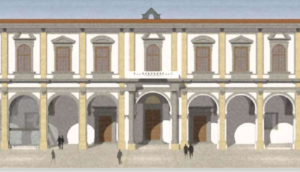Anniversary Events Open to the Public at Santa Maria Hospital

In celebration of the 734th anniversary of the Santa Maria Nuova Hospital (L’Ospedale di Santa Maria Nuova), the Santa Maria Nuova Foundation has organized a full day of events on June 23 dedicated to two historical figures: Folco Portinari and Maurizio Bufalini. The Santa Maria Nuova Hospital is the oldest hospital that is still active worldwide, founded in 1288 when the first of the two honorees, Portinari, a Florentine, donated the land. The second honoree, Maurizio Bufalini, was a 19th century Italian physician who revolutionized medical teaching practices, emphasizing treatments that derived from concrete facts and observations. There will also be guided visits of the hospital grounds and its many historic artworks.
The tours feature various works of art dating back centuries. Among the pieces visitors can admire are three frescoes that were detached from the walls of the adjoining Church of Sant’Egidio, which picture fascinating imagery of the original façades of the church and the hospital. The hospital also hosts several works created by Renaissance goldsmith and sculptor Lorenzo Ghiberti, who is best known as the creator of the bronze doors of the Florence Baptistery, which Michelangelo later called the “Gates of Paradise.” Inside a small room that holds the hospital’s most precious artistic works one can see a tabernacle, or a small container that traditionally contains the Eucharist in Catholic churches, created by Bernardo Rossellino and Lorenzo Ghiberti. This room also displays a small gilded bronze door by Ghiberti, depicting Christ as the King of Heaven.
The hospital tour allows visitors to see the results of the significant restoration efforts that began in 2009. Thanks to the extensive work conducted over several years, guests can now enjoy the beautiful frescoes that decorate the walls of historic rooms such as the pharmacy and the room for healing herbs (spezeria).
The guided visits will take place at 3 and 4 pm and, as with all of the events being held in honor of the hospital’s anniversary, require an advance reservation which can be made by emailing info@fondazionesantamarianuova.it. While on hospital grounds guests must wear FFP2 masks and green passes will be checked upon entry.
In honor of Portinari, the hospital will hold a seminar entitled “Folco Portinari, His Florence and His Hospital” (Folco Portinari, la sua Fiorenza e il suo Ospedale) led by Chief Medical Director Sandro Boccadoro. The seminar will take place at 3 pm on June 23.
The Portinari family belonged to medieval Florentine nobility and were very active in the politics of the era. The patriarch of the Portinari family was convinced to donate the land upon which the Santa Maria Nuova Hospital would be built by Monna Tessa, governess of the household, who persuaded the rich banker to aid in the creation of a hospital for the city’s poor. Today, the Portinari name is largely known due to Folco’s daughter Beatrice, who 14th century Italian writer Giovanni Boccaccio suggested was the same Beatrice that stole the heart of famed poet Dante Alighieri.
The second seminar, entitled “Maurizio Bufalini and the Search for the Truth” (Maurizio Bufalini e la ricerca del vero) will take place at 4:30 pm. The seminar will be led by Professor Donatella Lippi, a renowned historian who specializes in archeology, archival science, and the history of medicine.
Maurizio Bufalini, who was born into a family of doctors, began criticizing medical practices and theories that were not scientifically backed at a young age. He was born in Cesena, a city in the Emilia-Romagna region, but throughout his prolific career he worked and taught in numerous Italian cities, including Pavia, Milan, and Bologna. He is best known for opposing the then-popular theories of Brownism, which promoted the idea that disease was caused by an inappropriate amount of stimulation, and Vitalism, the theory that life arises as a result of a strange “vital force” unique to living creatures. Bufalini was instrumental in the advancement of science past such philosophies and toward a purely scientific approach. (ann webb)
